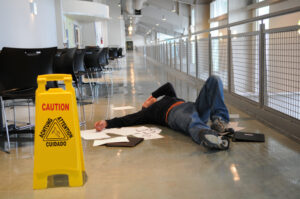 Risk of Liability for Storeowners
Risk of Liability for Storeowners
Retailers are constantly at risk of liabilities most of which involve their customers. Generally, as property owners, they have a duty to ensure their property does not contain hazards. According to Illinois law, their customers are basically ‘invitees’ who are entitled to a reasonable amount of care while they are on said property.
So yes, if a customer is injured on their property, retailers can be held liable for damages. This can include hazards they created knowingly or unknowingly, which they failed to eliminate in a timely manner.
The Importance of Premise Liability
Areas, where customers should be safe from harm, include dressing rooms, parking lots, aisles, and restrooms. All these areas should be maintained on a regular basis to ensure they are free of hazards. If a retailer fails to do this and a customer gets injured because of his/her negligence, they can be sued.
This is called premise liability and the level of care that the retailer should have shown will depend on whether the injured party was:
An invitee – Someone who was invited onto the property for the benefit of the owner (such as customers).
A licensee – Someone who was allowed to enter the property to visit the owner for personal reasons.
A trespasser – Someone who entered the property without the consent of the owner. The property owner does not owe them a duty of reasonable care.
The Case for Slip and Fall Accidents
The most common injuries in retail stores are usually the result of slip and fall accidents. The accident typically occurs when an individual slips on a foreign substance or because of a hazardous condition in-store. This can be from anything from spilled milk that was not cleaned up in a timely manner to broken tiles that the retailer did not replace in time. You can also sue for additional damages if the property owner did not place warning signs around such areas.

If you slipped and fell in a retail store and suffered from injuries that could have been avoided, you have the right to claim compensation for your pain, suffering, and medical costs. The Law Offices of Robert T. Edens has over two decades of experience protecting the rights of accident victims such as yourself. Get in touch with us for an in-depth consultation today! Do not hesitate to reach out to us at our offices in Libertyville, Waukegan, Woodstock, and Antioch, Illinois.

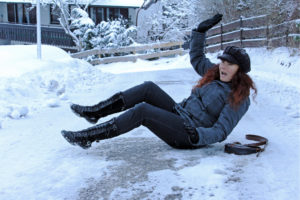 Winter brings with it snow, which accumulates on pavements, melts and becomes a hazard for the unwary. However, if you slip, fall and sustain injuries on someone’s property, you can file a lawsuit against them for negligence.
Winter brings with it snow, which accumulates on pavements, melts and becomes a hazard for the unwary. However, if you slip, fall and sustain injuries on someone’s property, you can file a lawsuit against them for negligence.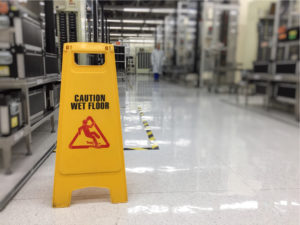 According to the
According to the  In Illinois, slip and fall cases fall under the umbrella of personal injury claims under tort law. If you have sustained injuries due to a slip and fall caused by the negligence of someone else, then you have a legal right to initiate a lawsuit to collect compensation for your pain and suffering and recover certain expenses that you incurred, including your medical costs. You may file a case against the negligent party by hiring an experienced
In Illinois, slip and fall cases fall under the umbrella of personal injury claims under tort law. If you have sustained injuries due to a slip and fall caused by the negligence of someone else, then you have a legal right to initiate a lawsuit to collect compensation for your pain and suffering and recover certain expenses that you incurred, including your medical costs. You may file a case against the negligent party by hiring an experienced 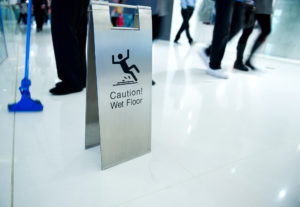 Slip & Fall accidents are the
Slip & Fall accidents are the  Going for shopping in the holiday season is an activity everyone is eager about and looks forward to. Some people make plans with their loved ones to travel to the other side of the town to shop at an exclusive shopping center. Whether you are window shopping or purchasing a dress/suit from your favorite brand’s shop in a mall, you expect the premises to be free from any hazards.
Going for shopping in the holiday season is an activity everyone is eager about and looks forward to. Some people make plans with their loved ones to travel to the other side of the town to shop at an exclusive shopping center. Whether you are window shopping or purchasing a dress/suit from your favorite brand’s shop in a mall, you expect the premises to be free from any hazards.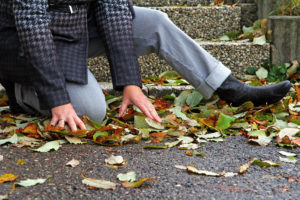 Slip and fall accidents can take place practically anywhere – on an uneven sidewalk, a wet surface in a store, or a broken staircase in a commercial building. Injuries stemming from these accidents can result in lasting effects, depending on their severity. When it comes to a slip and fall accident on a public sidewalk, it can be difficult to determine who is liable for your injuries.
Slip and fall accidents can take place practically anywhere – on an uneven sidewalk, a wet surface in a store, or a broken staircase in a commercial building. Injuries stemming from these accidents can result in lasting effects, depending on their severity. When it comes to a slip and fall accident on a public sidewalk, it can be difficult to determine who is liable for your injuries.
